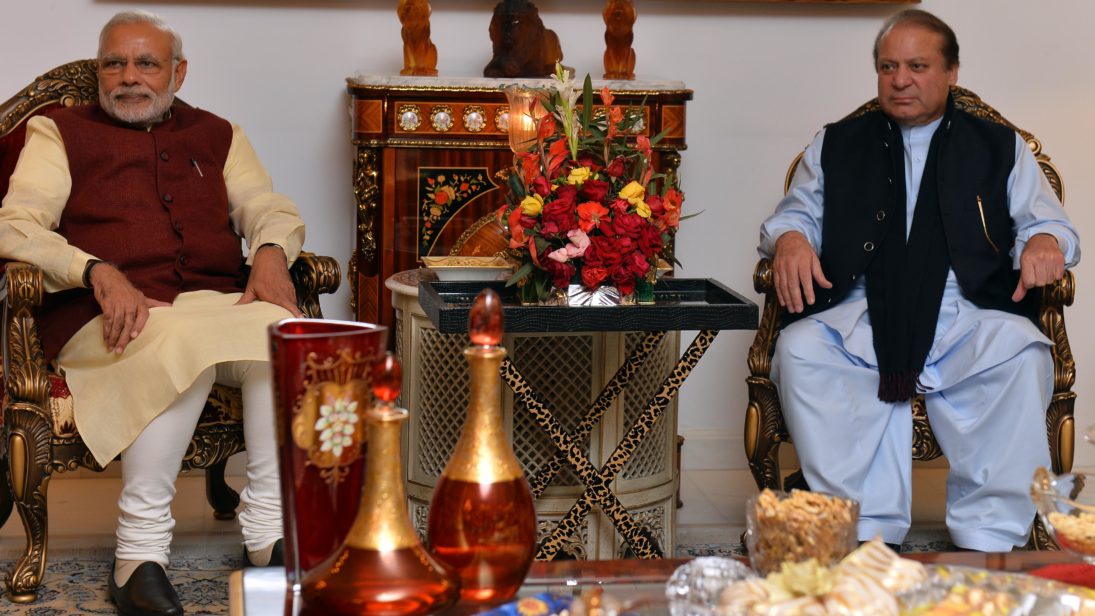
Point, Counter-Point: A Four Part Series
Between the Boots and the BJP, Waning US Influence in South Asia? by Amina Afzal
The Future Role for Washington by Tridivesh Singh Maini
Growing U.S. Role in Indo-Pak Relations by Muhammad Jawad Hashmi
India-Pakistan Relations on a One to One Basis by Reshmi Kazi
***
Fifteen years since the May 1998 nuclear tests, India and Pakistan have come a long way and managed bilateral ties without getting embroiled in any major wars. This in no way implies that the nuclear neighbours have been on exemplary friendly terms. Far from cordial ties India and Pakistan have been involved in several crises – Kargil conflict (May 1999), attack on the Indian Parliament (December 2001), India-Pakistan Standoff (2001-2002), Mumbai attacks (2008), the continuing Kashmir conflict, and frequent cross-border skirmishes across the Line of Control. In these recent conflicts the role of the United States as a third party mediator have been either limited or zero. Why? There can be two answers to this question. First, that the US is wary of meddling into the seemingly intractable affairs of India and Pakistan, apprehending this might annoy New Delhi. Second, the nuclear-armed nations, particularly India, believe that regional dynamics are premised upon a bilateral framework for peace building in South Asia. Hence, the regional partners must endeavor to ensure cordial relations in the region.
Given this backdrop, one could question: is this trend going to continue? South Asian regional dynamics would increasingly witness a diminished US role in the bilateral issues of India and Pakistan. This assertion is made from the trend that was witnessed from the US position in the some of the recent India-Pakistan crises.
On the Kargil issue, the US played a dominant role that helped to diffuse the situation in 1999. President Clinton’s communication to Prime Minister Nawaz Sharif during the Kargil crisis influenced the course of actions and helped brought the crisis to an end. But it must also be borne in mind that Pakistan’s acquiescence to Washington’s diktat was embedded in reasons for face-saving. Pakistan was faced with international opprobrium from all quarters including the US. The Vajpayee Government was adamant in its stand for the unconditional withdrawal of the Pakistani troops. Given the Indian security situation, Prime Minister A.B. Vajpayee stood firm in his position by declining Clinton’s invitation for a meeting with Sharif in Washington thereby marginalizing intense US backroom diplomacy during the 1999 Kargil conflict. Pakistan had to buckle to India’s unconditional demands.
After the 2001 attacks on the Indian Parliament, Washington rejected President Pervez Musharraf request for mediation with India. The US clearly expressed that mediation or facilitation would not help tide the security situation in any way. The Bush government, while refraining from any intervention, suggested bilateral dialogue as the most appropriate means to restore normalcy. The US role during the 2001-2002 India-Pakistan stand-off was remarkably impartial. The US was interested in crisis management and expressed its position of not satiating the desires of any of the conflicting parties.
On the Mumbai attacks, the US was once again witness to attempts to alleviate tensions between India and Pakistan without directly getting involved in the complex scenario. Risking Pakistan’s displeasure, the Obama administration has ruled out playing a formal mediation role between India and Islamabad on the issue of the disputed Kashmir territory. While pressing for a resolution of the Kashmir imbroglio, Washington has made clear that it would not directly mediate on the enduring conflict that has fueled a nuclear-arms race in South Asia.
On the enduring India-Pakistan vexed issues, Washington is not ideally placed to be an active mediator. Even though Pakistan would welcome Washington’s intervention, such position may be strongly opposed by India. India believes in dealing with Pakistan on a bilateral basis where both nations will engage in meaningful dialogue to sort out their vexed issues. India believes any violation of such understanding would derail future cooperation. This is evident from the recent cancellation of India-Pakistan foreign secretary level talks by the Modi Government after the meeting between Pakistan High Commissioner and Kashmiri leaders. Describing the cancellation of talks as “unfortunate” and expressing hope for improved bilateral ties, Washington has refrained from taking any strong stand on the issue.
On the prevailing India-Pakistan nuclear issues, Washington’s role is again restrained. India and Pakistan have expressly stated their respective positions and refused to adhere and accede to the Non Proliferation Treaty (NPT), refused to accept the indefinite extension of the NPT, declined to sign the CTBT and curb their nuclear weaponisation programme. In the face of a regional nuclear arms race, nuclear proliferation, risks of nuclear terrorism and possibilities of accidental nuclear war, Washington has been unable to do anything substantial to reduce dangers. The US equation with India over issues of the CTBT and NPT is well known just as Washington’s equation with Pakistan over the FMCT. Given so, it can be presumed that Washington will be unable to do much on influencing India and Pakistan to relinquish their declared stands.
Given the trend, Washington would maintain a neutral position in the South Asian regional dynamics in the future. After the India-US civil nuclear agreement, Washington would not complicate its relations with India in whom it sees a strategic partner. Simultaneouly, Washington would not irk Pakistan (who is already upset with the India-US nuclear deal) and scuttle Islamabad’s cooperation on the Afghanistan problem. Hence, for Washington it would be most convenient to display that a mediator’s role is best served when all the negotiating parties welcome such intervention. Presently, India is not comfortable with any active US mediation on the ongoing regional issues.
The above account draws a pessimistic scenario of South Asian regional dynamics. However, just as there is light at the end of every tunnel, there is hope for improved India and Pakistan bilateral ties, which might be realised only when both neighbours resolve their differences amicably on a one to one basis.
***